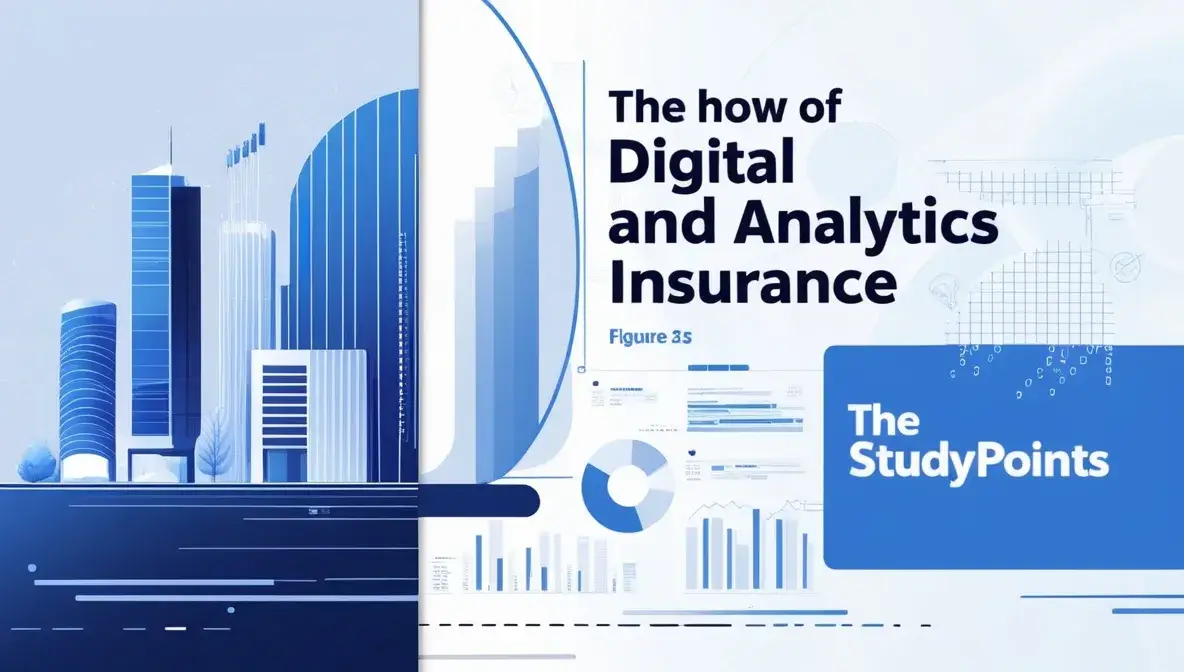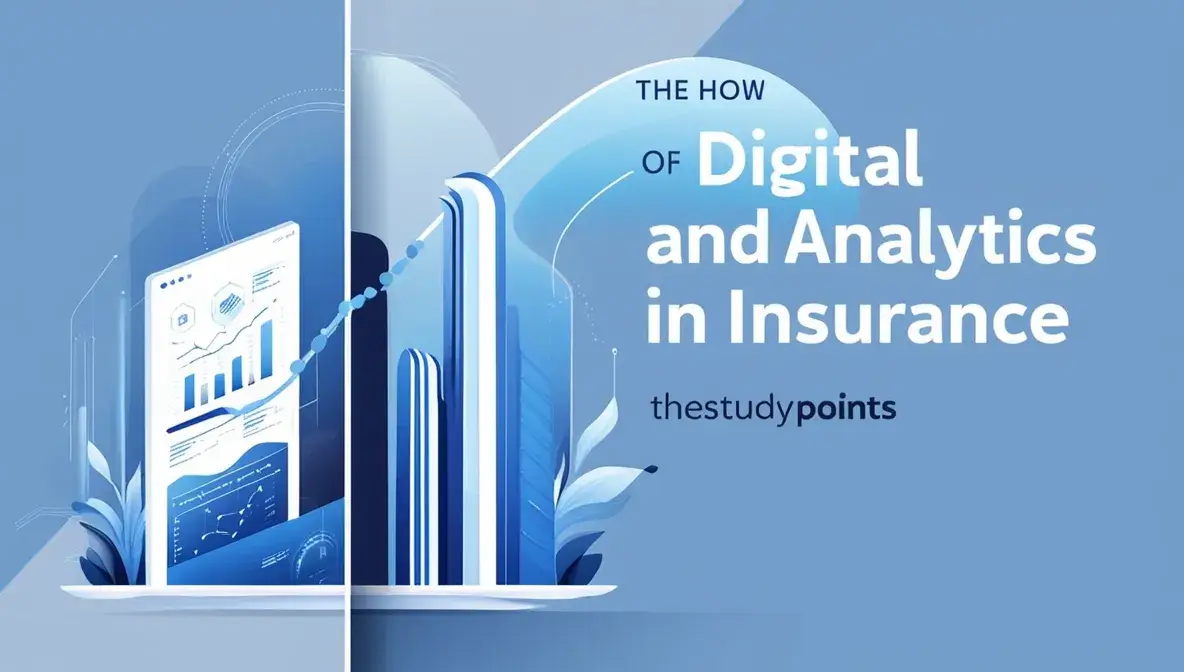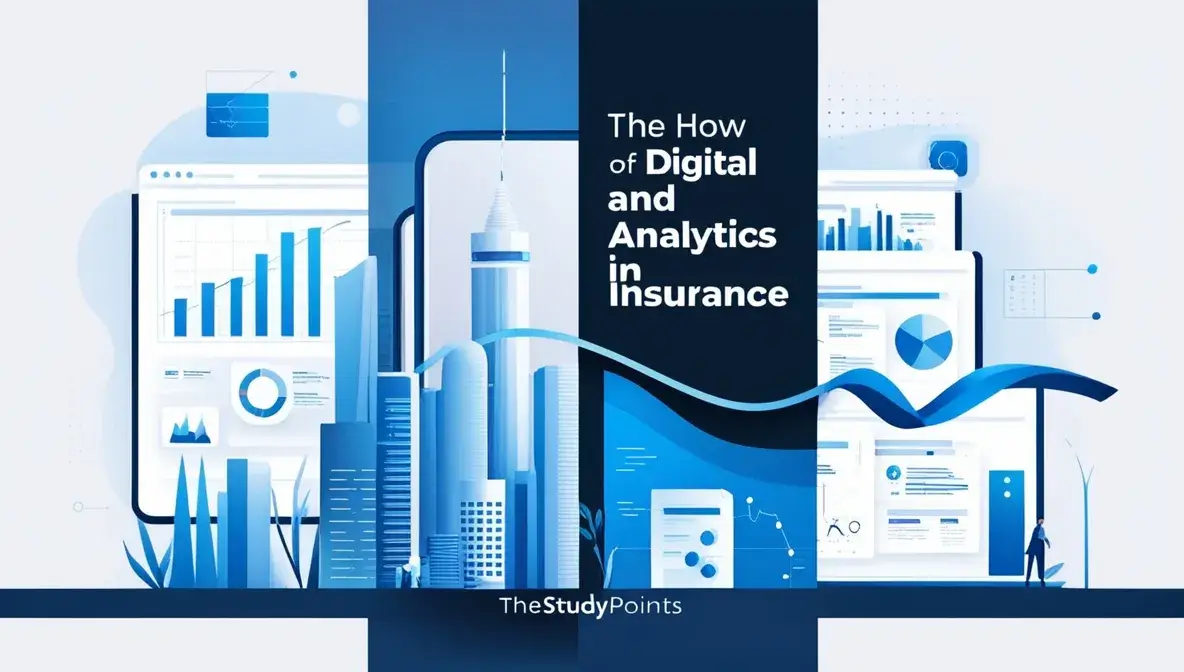Why Digital and Analytics Matter in Insurance
The insurance industry has always been data-driven, but the advent of digital transformation and analytics has revolutionized the way insurers operate. From managing risks to improving customer experiences, the integration of technologies like Artificial Intelligence (AI), Machine Learning (ML), and Big Data has unlocked unprecedented opportunities.
In today’s fast-paced digital world, customers demand personalized services, faster claim settlements, and streamlined experiences. Digital tools and analytics enable insurers to meet these expectations while reducing operational costs, mitigating fraud, and gaining a competitive edge.
A report by McKinsey highlights that insurers who embrace digital transformation see a 30-50% improvement in their efficiency, with customer satisfaction increasing by 20-30%. Clearly, digital insurance solutions are no longer optional—they are a necessity.
How Digital Transformation Works in Insurance

Embracing Data-Driven Decision Making
One of the cornerstones of digital transformation in the insurance industry is data-driven decision making. Insurers now leverage Big Data to analyze customer behavior, assess risks, and predict market trends.
- Real-time Data Insights: By accessing real-time data from IoT devices, telematics, and mobile apps, insurers can make instant, informed decisions.
- Customer Segmentation: Advanced predictive analytics enables insurers to categorize customers based on behavior, preferences, and risk profiles. This helps in designing personalized insurance products tailored to individual needs.
- Predictive Modeling: Using ML algorithms, insurance companies can forecast potential claims, assess risks, and optimize pricing strategies.
Fact: According to Accenture, 84% of insurers who adopt data-driven decision making report higher profitability.
Leveraging Artificial Intelligence (AI)
AI-powered platforms have transformed the insurance industry by automating repetitive tasks and enhancing decision-making processes.
- Fraud Detection: AI systems analyze patterns in claims data to identify anomalies, reducing fraudulent payouts significantly.
- Underwriting Algorithms: AI-driven underwriting algorithms streamline policy issuance by evaluating risks more accurately than traditional methods.
- Sentiment Analysis: By analyzing customer feedback and interactions, AI helps insurers gauge customer sentiment, leading to improved service strategies.
Example: James, a small business owner, applied for AI-powered commercial insurance. The underwriting system assessed his risk profile in minutes, issuing a customized policy instantly.
Automating Claims Processing
Claims handling is one of the most critical aspects of the insurance industry, and claims automation software has revolutionized this process.
- Robotic Process Automation (RPA): RPA automates repetitive tasks like data entry, document verification, and payment processing, reducing claim settlement times.
- Optical Character Recognition (OCR): OCR extracts data from documents like medical bills or repair invoices, eliminating manual errors.
- Chatbots: AI-powered chatbots guide customers through the claims process, ensuring a seamless experience.
Stat: Insurers using claims processing automation have reduced settlement times by up to 60%, according to Deloitte.
Enhancing Customer Experience with Digital Tools
In a competitive market, customer satisfaction is paramount. Digital tools like mobile apps for policy management and self-service portals empower customers to manage policies, file claims, and access support effortlessly.
- CRM Software: Modern CRM platforms integrate customer data, enabling proactive engagement and better service.
- Telematics: For auto insurers, telematics devices track driving behavior, offering real-time feedback and tailored premiums.
- AI Chatbots for Insurance: Virtual assistants provide instant support, reducing wait times and enhancing user satisfaction.
Example: Sarah, a policyholder, used her insurer’s self-service portal to update her address and file a claim—all without speaking to an agent.
Step-by-Step Guide to Implementing Digital and Analytics in Insurance

Step 1: Define Your Goals
Start by identifying what you want to achieve with digital transformation. Common objectives include:
- Enhancing operational efficiency
- Improving customer experience
- Reducing claim settlement times
- Mitigating fraud with AI-powered insurance tools
Tip: Use KPIs (Key Performance Indicators) to track progress, such as customer satisfaction scores or claim processing times.
Step 2: Invest in the Right Technology
Choosing the right technologies is critical. Focus on solutions like:
- AI-powered platforms for underwriting and claims
- CRM systems for customer management
- Blockchain for secure data sharing
- Robotic Process Automation (RPA) for repetitive tasks
Table: Key Technologies for Digital Insurance Solutions
| Technology | Use Case | Example |
|---|---|---|
| AI and ML | Fraud detection, underwriting | Predictive analytics |
| Blockchain | Secure transactions, data sharing | Claims settlement |
| OCR | Document processing | Invoice scanning |
| Telematics | Risk-based pricing for auto insurance | Real-time tracking |
Step 3: Focus on Data Quality
Data is the backbone of digital transformation. Insurers must prioritize data accuracy, consistency, and security.
Checklist for Data Quality:
- Ensure compliance with regulations like GDPR.
- Use advanced data analytics tools for cleansing and validation.
- Integrate multiple data sources for a 360-degree view of customers.
Step 4: Train Your Team
No technology can succeed without skilled personnel. Insurers must invest in training employees to adapt to digital tools.
- Conduct workshops on AI, RPA, and Big Data.
- Encourage collaboration between IT and business units.
- Upskill agents with tech-savvy tools like CRM software and mobile apps.
Step 5: Measure Success
Evaluate the effectiveness of your digital insurance strategies by tracking metrics such as:
- Claim settlement times
- Customer satisfaction rates
- Fraud detection accuracy
- Premium growth
Use real-time data insights to adjust strategies and improve outcomes continuously.
Benefits of Digital and Analytics in Insurance
The benefits of digital transformation in the insurance industry are immense:
- Faster Claims Processing: Automation reduces settlement times, boosting customer satisfaction.
- Improved Risk Management: Predictive modeling and telematics help insurers price policies accurately.
- Fraud Mitigation: AI systems detect fraudulent claims, saving billions annually.
- Enhanced Customer Experience: Self-service portals and AI chatbots provide seamless interactions.
- Cost Efficiency: RPA and OCR reduce operational costs by automating manual tasks.
Stat: Capgemini reports that insurers who embrace AI-powered insurance tools see a 20% increase in profitability.
Why Choose TheStudyPoints?

TheStudyPoints is a trusted provider of insurance digital transformation solutions. With expertise in technologies like AI, Big Data, and Blockchain, TheStudyPoints helps insurers:
- Streamline operations with cutting-edge tools.
- Enhance customer satisfaction through AI-powered platforms.
- Reduce fraud with advanced predictive analytics and ML algorithms.
Quote from a Client: “TheStudyPoints transformed our claims process with claims automation software, reducing settlement times by 50%.”
Conclusion
The integration of digital tools and analytics is reshaping the insurance industry, offering unprecedented opportunities for innovation, efficiency, and customer satisfaction. From AI-powered fraud detection to telematics-based risk assessments, insurers can now deliver personalized, transparent, and seamless services.
By following a structured approach—defining goals, investing in technology, focusing on data quality, training teams, and measuring success—insurers can unlock the full potential of digital transformation.
Partnering with experts like TheStudyPoints ensures that your journey toward digital-first insurance strategies is both smooth and successful. Embrace the future of insurance today!

Tina Morris is an expert tech blogger, passionate about simplifying complex innovations. She delivers cutting-edge insights, trends, and solutions to empower readers in the ever-evolving tech landscape.
